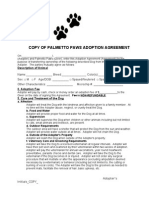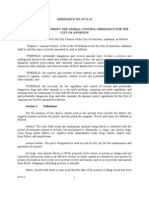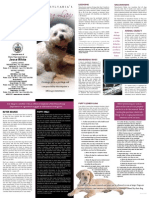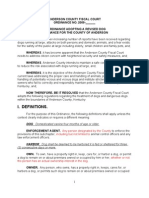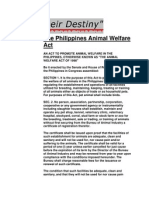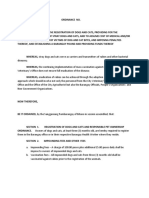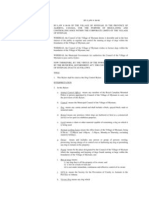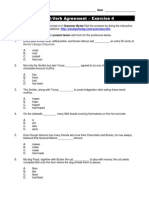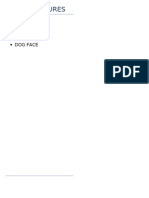City Code, Dog
City Code, Dog
Uploaded by
clark4presidentCopyright:
Available Formats
City Code, Dog
City Code, Dog
Uploaded by
clark4presidentCopyright
Available Formats
Share this document
Did you find this document useful?
Is this content inappropriate?
Copyright:
Available Formats
City Code, Dog
City Code, Dog
Uploaded by
clark4presidentCopyright:
Available Formats
City of San Antonio Code: Regulating the Care and Control of Animals
Leashing and Control. All dogs must be confined to their owner's property at all times except when on a leash. Animal Care Officers have the legal authority to enter unenclosed front yards of private property to impound unrestrained animals. Rabies Vaccination. All dogs, cats and domestic ferrets must be vaccinated against rabies by sixteen (16) weeks of age by a licensed veterinarian. Booster vaccinations are required by State, County and City law one year following the initial rabies vaccination and then at one or three year intervals depending on the vaccine used. Other vaccinations are highly recommended and you should establish a relationship with a veterinarian for your pet. Licensing. All dogs, cats and domestic ferrets must be licensed by sixteen (16) weeks of age and annually thereafter with the City of San Antonio, Animal Care Services Division. Proof of current rabies vaccination must be demonstrated when the license, in the form of a microchip, is issued. Dogs should wear license tags on their collar at all times when outside. License fees are not required for government owned working dogs or dogs properly trained to guide or otherwise assist a physically handicapped person. No person may use any pet license for any dog other than the pet for which it was issued.
Animal Limits. A maximum number of eight (8) cats or five (5) dogs or an aggregate number of eight (8) may be permitted at a residence within the City limits. ) The total number of domestic fowl and livestock allowed at a residence is five (5) which may include: up to three (3) domestic fowl; and up to two (2) animals from the following classes of livestock-equines,bovines,sheep,goats and llamas. Strays. The City Code defines an owner of an animal as a person or the legal guardian of the person who feeds or harbors the subject animal for more than 72 hours without the presence of the subject animal being recorded in the records of the Animal Care Services Department as a stray animal. Animal Bites. All animal bites and scratches which have broken the skin must be reported to the Animal Care Services Division within 24 hours by calling 737-1600 OR 287-2778 anytime day or night. Biting animals are required by State, County and City law to be quarantined for rabies observation for 10 days from the date of the bite, regardless of the vaccination status of the animal. Prohibited Species. It is unlawful to keep wild animals and many other species within the City of San Antonio. Such animals include monkeys and other non-human primates, wolf hybrids, coyotes, foxes, exotic cats, bears, skunks, raccoons, miniature Vietnamese pot-bellied pigs, poisonous reptiles, crocodiles and related species. Abandoned Animals. It is unlawful to abandon an animal within the City Limits. An abandoned animal is any animal abandoned while in the persons custody without making reasonable arrangements for assumption of custody by another person.
City of San Antonio Code: Regulating the Care and Control of Animals
Dangerous Animals. Upon receipt of an affidavit of complaint signed by one or more individuals, made under oath before a notary public, the Animal Care Services staff will investigate the complaint of a dangerous animal. The owner has the right to provide an affidavit in defense of the animal. If the investigator determines that impoundment of the animal is a reasonable precaution until the matter is resolved, the Animal Care Veterinarian may order immediate seizure. Upon a timely submitted written notice to the owner of the animal being investigated, a dangerous animal determination hearing will be scheduled by the department Director. A dangerous animal determination board will review the facts of the affidavits and subsequent investigation and hear evidence offered by the owner of the animal. A written determination will be given to the animal owner within five days. If the animal is declared dangerous, the owner has five days to appeal the board's decision to the Municipal Court for an administrative hearing. A dangerous animal must be annually licensed as a dangerous animal by the Animal Care Services Department; wear a collar approved by the Animal Care Veterinary Services Manager at all times; be kept in a proper enclosure; have a file at the department with a certificate of public liability insurance for $100,000 which will be kept continuously in effect; be muzzled and leashed when out of the enclosure; be identified with a microchip; and be spayed/neutered. Vicious Animals. Similar to a Dangerous animal investigation, upon receipt of an affidavit of complaint signed by one or more individuals, made under oath before a notary public, the Animal Care Services staff will investigate the complaint of a vicious animal. The owner has the right to provide an affidavit in defense of the animal. If the investigator determines that impoundment of the animal is a reasonable precaution until the matter is resolved, the Animal Care Veterinarian may order immediate seizure. Upon a timely submitted written notice to the owner of the animal being investigated, a vicious animal determination hearing will be scheduled by the department Director. A vicious animal determination board will review the facts of the affidavits and subsequent investigation and hear evidence offered by the owner of the animal. A written determination will be given to the animal owner within five days. If the animal is declared vicious, the owner has five days to appeal the board's decision to the Municipal Court for an administrative hearing. A vicious animal must be annually licensed as a vicious animal by the Animal Care Services Department; wear a collar approved by the department at all times which is visible at 50 feet; be kept in a proper enclosure; be muzzled and leashed when out of the enclosure; be identified with a microchip; and be spayed/neutered. The owner of the designated vicious animal shall also post a sign on his premises warning there is a vicious animal on the property. Sale of animals. No live animals shall be sold, traded, bartered, leased, rented, given away, or displayed for a commercial purpose on any roadside, public right-of-way, commercial parking lot or at any flea market or festival. Sale of baby chicks, ducklings or other fowl and rabbits. It is illegal for any person to sell or offer for sale, barter, lease, rent or give away on the condition that some other item is purchased,
City of San Antonio Code: Regulating the Care and Control of Animals
bartered, leased, or rented, any baby chicks, ducklings, other fowl less than three (3) weeks old, or rabbits less than eight (8) weeks old; except at facilities or hatcheries or in stores engaged in the business of selling the same to be raised for commercial purposes. It is also unlawful to color, dye, stain, or otherwise change the natural color of any baby chicks, ducklings, or other fowl or rabbits or to possess for the purpose of sale any baby chicks, ducklings, or other fowl or rabbits which have been so colored. AnimalPermits/Licenses. Approved by City leaders in late 2007, the revised Chapter 5 Ordinance institutes a permitting and licensing process for variety of animal related concerns beyond general pet licensing. Effective March 1st, 2008, there will be new permits governing areas like animal related businesses as well as residential pet concerns like litter permits, excess animals, livestock and cat colonies. Permits related to intact or unsterilized animals will not go into affect until January 1st, 2009. Permit applications and instructions can be found on the ACS website. All fees are payable to the City of San Antonio. Intact dog permit (Effective 1/1/09) Any owner or keeper of a dog that is not spayed or neutered must obtain an intact dog permit, unless the dog qualifies for a certified medical exception from a licensed veterinarian or is less than six (6) months old. This does not apply to 1) A dog or cat owner who is a nonresident of this City and is keeping the subject pet in the City for fewer than sixty (60) days; or 2) Dog or cat owners who have been a resident of this City for fewer than thirty (30) days. Litter permit. Any person whose female dog or cat has a litter must obtain a litter permit prior to or within ten (10) business days of the litters birth. The issuance of a permit authorizes the whelping of no more than one (1) litter per female dog or cat in any twelve (12) month period. If a person fails to obtain a permit after notice, then the Department shall be authorized to impound the female dog or cat and the animal litter. The litter permit number shall be prominently displayed in all advertisements, notices, or displays of the litter for sale or trade or offers to give away any members of the litter. No person may offer any puppy or kitten under the age of eight (8) weeks for sale, trade or other compensation or for free giveaway (except a puppy or kitten, or litter or litters taken to the Department, or any tax-exempt nonprofit organization founded for the purpose of providing humane sanctuary or shelter for abandoned or unwanted animals, or any recognized rescue organization which is currently registered with the Department). This permit does not apply to caretakers of feral cat colonies and rescuers affiliated with recognized rescue organizations registered with the Department. Excess animal permit. Excess animal permits can be purchased for dogs and/or cats, fowl and livestock. A maximum number of eight (8) cats or five (5) dogs, or an aggregate number of eight (8) is permitted at a residence within the City limits. In order to have more dogs and/or cats than allowed at a residence, an owner must apply for an excess animal permit which shall be valid for three (3) years. The criteria used to evaluate the granting of an excess dog or cat permit are as follows: All dogs and cats for which a permit is required must be sterilized, unless the dog (s) or cat (s) qualifies for
City of San Antonio Code: Regulating the Care and Control of Animals
a certified medical exception by a licensed veterinarian or is under six (6) months old. All dogs and cats must be currently vaccinated for rabies and currently licensed by the City. The dogs and/or cats must not be housed exclusively outside. All dogs and cats must be microchipped and a photograph of each animal must be attached to an animal profile sheet that will be kept on record as verification of the animals allowed in the permit. If the owner of the dogs and/or cats is not the owner of the property, the permission of the property owner must be obtained before a permit application will be processed. A check will be made to determine if there are any previous valid complaints which could be grounds for the denial of a permit request. The requestor must have adequate property or facilities to ensure the dogs and/or cats do not disturb any neighbors. Once a permit is granted, the permittee must obey all rules pertaining to pet ownership within the City and the State. Any valid violation, including exceeding the number of dogs and cats allowed on the original permit is grounds for revocation of the permit by the Department. If a permit is revoked, the permittee will have thirty (30) days to come into compliance with existing numbers limits. The criteria used to evaluate the granting of an excess livestock permit are as follows: All livestock must be enclosed in a pen the nearest point being at least one hundred (100) feet from any dwelling or business building owned or occupied by any person other than the owner. All domestic fowl must be kept in an enclosure. An owner must have adequate facilities to house the livestock and domestic fowl and ensure adequate sanitation. The livestock and domestic fowl must also be kept housed or confined in a manner that does not allow them to create a nuisance. In addition, sanitation must be addressed in a manner that prevents the attraction of pests. Any valid violation, including exceeding the number of animals allowed on the original permit is grounds for revocation of the permit by the Department. If a permit is revoked, the permittee will have thirty (30) days to come into compliance with existing numbers limits.
Livestock permits.
Residents keeping livestock in the City must apply in writing and obtain a permit from Animal Care Services. The permit is only valid for the location for which it was issued. A person who keeps livestock as defined in city ordinance shall pay a permit fee per year for each animal. It shall be unlawful to keep or maintain swine within the City other than for the purposes and at the following locations: exhibition at stock shows, fairs and circuses; at vocational schools with properly constructed facilities; slaughtering establishments; when offered for sale at union stockyards or adjacent auction barns; under limited approved and permitted conditions at the home of FFA or 4-H enrollees under the direct supervision of the county agricultural agent. It shall be the duty of the Director of Health to have livestock found running at large in the City limits to be impounded at the public stockyards in the City.
Animal Exhibit Permit. Any operator of a circus, rodeo, animal exhibit, or entertainment show, or other persons desiring to bring any non-aquatic mammal into the City to use in a circus, rodeo, animal exhibit or animal show other than a dog show or a cat show, shall first submit a written request to the Department
City of San Antonio Code: Regulating the Care and Control of Animals
for a permit and pay a permit application fee to cover the cost of inspecting the facility where the animal(s) will be kept during the event, which may be for any number of consecutive days. The permit application shall be submitted at least twenty (20) days prior to the event, and shall contain information as to the kind and number of animals involved, the reason for bringing the animal(s) to the City, and the name and address of the person or business that will keep, feed, and confine the animal(s) during their stay in the City. Animals used within the City for entertainment purposes such as rodeos and circuses must be provided with all the necessities of life including air, food, water, veterinary care, exercise, and protection from the sun and other elements of nature. A licensed veterinarian must be in attendance at all such functions. Once determined to be injured or ill by a licensed veterinarian, an animal may be returned to use only after certification as healthy by a licensed veterinarian. A permit shall not be required for any animal so long as it is owned by a governmentally owned and operated facility, publicly operated facility, a public zoological park, or bona fide medical institution or research institution.
Pet shop license. No person shall operate any pet shop within the City limits without first obtaining a license from Animal Care Services who shall take into consideration the type of building construction, the regulatory compliance history of the permittee as it relates to sanitation, health, welfare of the animals, birds or reptiles housed, and related zoning requirements. The Director shall utilize a standardized check-list for inspecting and evaluating the qualifications of applicants. Each pet shop license shall be valid for one (1) year and applications for an original or renewal pet shop license shall be submitted to the Department and shall be approved or denied by the Director. The Department shall investigate the applicant's qualifications for a license, and report its findings to the Director. A conviction for the violation of any provision of Chapter 5 may constitute cause for denial or revocation of a license.Failure to intentionally, knowingly, or recklessly apply for a license prior to the opening of such a commercial animal facility, or within thirty (30) days after the renewal date, shall constitute a misdemeanor offense. Grooming shop license. Much like a pet shop license, no person shall operate any grooming shop without first obtaining a license from the Director who shall take into consideration the type of building construction, the regulatory compliance history of the permittee as it relates to sanitation, health, welfare of the animals, and related zoning requirements. The Director shall utilize a standardized check-list for inspecting and evaluating the qualifications of applicants. Each grooming shop license shall be valid for one (1) year Applications for an original or renewal grooming shop license shall be submitted to the Department and shall be approved or denied by the Director. The Department shall investigate the applicant's qualifications for a license, and report its findings to the Director. A conviction for the violation of any provision of Chapter 5 may constitute cause for denial or revocation. Failure to intentionally, knowingly, or recklessly apply for a license prior to the opening of such a commercial animal facility, or within thirty (30) days after the renewal date, shall constitute a misdemeanor offense. City ordinance allows a permit holder has the right to request that any dog or cat accepted for grooming be vaccinated against common diseases, and require proof of such vaccinations be furnished to the shop operator.
San Antonio Code: Regulating the Care and Control of Animals
Commercial dog kennels and catteries license. No person shall operate a commercial kennel/cattery without first obtaining a license from Animal Care Services. Such license shall be issued after inspection and approval of the facilities, taking into consideration the type of construction as it relates to sanitation, the health and welfare of the dogs and cats, and related zoning regulations. Failure to apply for a license prior to the opening of a commercial kennel/cattery, or within thirty (30) days after the renewal date is a City of misdemeanor offense.The Director of Animal Care or his designee, after an administrative hearing, shall make a determination of whether the commercial kennel/cattery conditions and the applicant's animal care practices meet the standards defined by law, whether the facilities are adequate, and whether the applicant is otherwise willing and capable of complying with City ordinances. Any unlicensed commercial kennel/cattery is hereby declared a public nuisance, and any animals above the legal limit allowed the resident may be impounded.This license does not apply to non-profit organizations established for the protecting and caring for stray and unwanted animals. Cat colony permit/ registration. The City of San Antonio now legally recognizes the practice of Trap Neuter Return as a progressive, humane approach to handling cat overpopulation issues. In a TNR program, outdoor cats identified in a group or colony are humanely trapped, sterilized and vaccinated and then released back into their territory. Each cat colony will be registered by the caretakers with Animal Care or its designee. Caretakers of feral cat colonies shall obtain a cat colony permit and implement proper management and sterilization practices as required by the Department. Any person or caretaker determined to be in violation of proper management and sterilization practices required by the Department shall be issued a written warning and be allowed up to 90 days to come into compliance, or provide satisfactory evidence of working to achieve compliance. Cat colonies with eight (8) or fewer cats are not required to be registered as a cat colony. Animal Care Services has the right to immediately seize and remove all, or parts of any colony for the following reasons: Public health and public safety concerns including rabies, other epizootic and certain zoonoses identified by the Department of Health; or the animals are creating a public nuisance as defined in Section 5-150 of Chapter 5. Permit/License Revocation. All permits issued by the City of San Antonio and Animal Care Services may be revoked by the Director, or his authorized representative, for violations of city or state law by the holder. Revocation of the permit is accomplished by mailing to the holder of such permit a written notice by certified mail stating his permit is revoked. Revocation of the permit may also be accomplished by personally delivering to the holder thereof a written notice stating his permit is revoked. Non-livestock Animal Waste; Sanitation Standards. Animal owners shall collect and dispose of animal waste in methods prescribed by the Animal Code to prevent odor and attraction of pests. Summary abatement may be directed by the Animal Care Services department and/or the director of code compliance. A pet owner or keeper shall not walk his/her dogs without a leash restraint, and shall not guide or take animals onto the yards or driveways of property not owned, leased or occupied by the animal owner for the purpose of allowing the animal to defecate, but shall keep his/her animal in the public right-of-way, and shall carry a container and scooper for the sanitary removal of his/her animal's fecal matter from the public right-of-way adjacent to any property with a structure or other improvement thereon.
You might also like
- Dog Breeders PermitDocument3 pagesDog Breeders PermitBhavish RamroopNo ratings yet
- Dog AdoptionDocument3 pagesDog Adoptionkjh267267No ratings yet
- An Ordinance Prohibiting All Kinds of Animals To Stray in Public and Private StreetsDocument4 pagesAn Ordinance Prohibiting All Kinds of Animals To Stray in Public and Private Streetsdon cong89% (9)
- Pet PolicyDocument5 pagesPet PolicyJared WrayNo ratings yet
- Anniston, Alabama Dangerous Dog Ordinance (Pit Bulls Declared "Vicious")Document12 pagesAnniston, Alabama Dangerous Dog Ordinance (Pit Bulls Declared "Vicious")DogsBite.org100% (1)
- ARTICLE - II. - aNIMAL - CONTROL (Revised by Kerry Draft 4-20) RUBIN 5-8-20 and 10-20 WITH UofF RecommendationsDocument19 pagesARTICLE - II. - aNIMAL - CONTROL (Revised by Kerry Draft 4-20) RUBIN 5-8-20 and 10-20 WITH UofF RecommendationsWJHG - TVNo ratings yet
- Pennsylvania Dog LawsDocument2 pagesPennsylvania Dog LawsJesse WhiteNo ratings yet
- Tema 19 PPPDocument10 pagesTema 19 PPPMiguel HPNo ratings yet
- Guidance Notes Dog Breeding EstablishmentsDocument3 pagesGuidance Notes Dog Breeding EstablishmentsIuliana BodaNo ratings yet
- Anderson Co. Dog Ordinance - Rev 1 - June 2009Document13 pagesAnderson Co. Dog Ordinance - Rev 1 - June 2009barbarajhaines5021No ratings yet
- Chapter 18 ANIMALS Sec. 18-15. Microchip FeeDocument13 pagesChapter 18 ANIMALS Sec. 18-15. Microchip Feereesediericks97No ratings yet
- An Ordinance Regulating The OwnershipDocument6 pagesAn Ordinance Regulating The OwnershipRonnie ManaoNo ratings yet
- AL BSL OrdinancesDocument152 pagesAL BSL OrdinancesMelanie HughesNo ratings yet
- Be It Ordained by The City of Providence:: 1. DefinitionsDocument4 pagesBe It Ordained by The City of Providence:: 1. DefinitionsDaphney DanielNo ratings yet
- Anti Rabies LawDocument20 pagesAnti Rabies Lawmariflorpagador.batuanNo ratings yet
- Stud Dog ContractDocument4 pagesStud Dog Contract4geniecivilNo ratings yet
- RA8485 Animal Welfare Act (Carabao Slaughter)Document2 pagesRA8485 Animal Welfare Act (Carabao Slaughter)Jazreth Gaile100% (1)
- NPLB ContractDocument3 pagesNPLB Contractapi-286000155No ratings yet
- Santaquin City Ordinances - Animal ControlDocument16 pagesSantaquin City Ordinances - Animal ControlKUTV2NewsNo ratings yet
- 2009 - 009Document12 pages2009 - 009glee100% (1)
- Pet Policy For RF Towers 5 6 & 7Document3 pagesPet Policy For RF Towers 5 6 & 7surekhasatputeconvergeNo ratings yet
- The Philippines Animal Welfare ActDocument6 pagesThe Philippines Animal Welfare ActmaykesguerraNo ratings yet
- Propose Ordinance For Dog and CatDocument6 pagesPropose Ordinance For Dog and CatNanett BagunuNo ratings yet
- Ra 8485 PDFDocument3 pagesRa 8485 PDFAl FrederickNo ratings yet
- BL2018 1159Document3 pagesBL2018 1159Anonymous GF8PPILW5No ratings yet
- Animal Welfare ActDocument5 pagesAnimal Welfare ActMoonlightDreamsNo ratings yet
- Title 2 (Animal Welfare) Chapter 1 (General Santos City Animal Shelter) Ord No 11 S of 2013Document6 pagesTitle 2 (Animal Welfare) Chapter 1 (General Santos City Animal Shelter) Ord No 11 S of 2013roy rubaNo ratings yet
- ContractDocument3 pagesContractsorimip136No ratings yet
- Police Module For Strict Compliance - Abhishek KadyanDocument35 pagesPolice Module For Strict Compliance - Abhishek KadyanNaresh KadyanNo ratings yet
- Chapter 7 Prevention of Cruelty To Animals Act 1960 Pharmacy Law and Ethics PDF Notes by NoteskartsDocument4 pagesChapter 7 Prevention of Cruelty To Animals Act 1960 Pharmacy Law and Ethics PDF Notes by NoteskartsmahanteshNo ratings yet
- Nov10 2012Document2 pagesNov10 2012pribhor2No ratings yet
- Pet PolicyDocument3 pagesPet PolicyBpr Bpr100% (1)
- Be It Enacted by The Senate and House of Representatives of The Philippines in Congress AssembledDocument7 pagesBe It Enacted by The Senate and House of Representatives of The Philippines in Congress AssembledTlf SlcNo ratings yet
- Be It Enacted by The Senate and House of Representatives of The Philippines in Congress AssembledDocument6 pagesBe It Enacted by The Senate and House of Representatives of The Philippines in Congress AssembledKate EvangelistaNo ratings yet
- nATRES RADocument44 pagesnATRES RALiz Matarong BayanoNo ratings yet
- Renting To Pet OwnersDocument10 pagesRenting To Pet OwnersrmtaquiNo ratings yet
- Aurora 2019 Aggressive Animal ProposalDocument20 pagesAurora 2019 Aggressive Animal ProposalMichael_Lee_RobertsNo ratings yet
- Service Support Animal Addendum REV 2Document2 pagesService Support Animal Addendum REV 2dudavgre456No ratings yet
- Animal Welfare LegislationDocument3 pagesAnimal Welfare LegislationRamel OñateNo ratings yet
- Haryana Municipal (Registration and Proper Control of Dogs) Bye-Laws, 2005 - Sukanya KadyanDocument4 pagesHaryana Municipal (Registration and Proper Control of Dogs) Bye-Laws, 2005 - Sukanya KadyanNaresh Kadyan100% (1)
- Ordinance NoDocument4 pagesOrdinance NoNichol Base100% (1)
- Pet Shop Rules - 3Document18 pagesPet Shop Rules - 3vidya.bishtNo ratings yet
- Wilson County Humane Society Adoption PoliciesDocument2 pagesWilson County Humane Society Adoption PoliciesWillian WallasNo ratings yet
- R.A. 8485 (The Animal Welfare Act of 1998)Document4 pagesR.A. 8485 (The Animal Welfare Act of 1998)Gail Rocamora-petilosNo ratings yet
- Adoption ApplicationDocument4 pagesAdoption ApplicationScribdTranslationsNo ratings yet
- Animal Welfare Act As AmendedDocument5 pagesAnimal Welfare Act As AmendedJoel C AgraNo ratings yet
- Agric-114-Chapter Ii: Rules and Regulations Governing Meat Inspection in The PhilippinesDocument16 pagesAgric-114-Chapter Ii: Rules and Regulations Governing Meat Inspection in The PhilippinesAgrikultura 2600100% (1)
- Law 4Document4 pagesLaw 4Diksha NanglaNo ratings yet
- Cat Adoption ContractDocument5 pagesCat Adoption ContractAbidah BajwaNo ratings yet
- Res#2018-697 PROVINCIAL ORDINANCE NO. 2018-177 - Responsible Pet Ownership Ordinance of 2018Document6 pagesRes#2018-697 PROVINCIAL ORDINANCE NO. 2018-177 - Responsible Pet Ownership Ordinance of 2018Imarie Pinuela100% (1)
- Makati City Ordinance 2004-A-010Document8 pagesMakati City Ordinance 2004-A-010Jinny JacariaNo ratings yet
- Intervention Application in MH 14 GU 8479 VehicleDocument10 pagesIntervention Application in MH 14 GU 8479 VehicleGupta MukeshNo ratings yet
- The Anti Cattle Rusting Act PD 533Document11 pagesThe Anti Cattle Rusting Act PD 533Noel FrancisNo ratings yet
- Ra8485 - Animal Welfare ActDocument4 pagesRa8485 - Animal Welfare ActLeah DurbanNo ratings yet
- Guide Questions For Episode 6Document4 pagesGuide Questions For Episode 6alphagreenboxNo ratings yet
- Cat Adoption ContractDocument4 pagesCat Adoption Contractbiosil medaNo ratings yet
- Amended Petshop RulesDocument29 pagesAmended Petshop RulesVignesh karthikNo ratings yet
- Adoptioncontractnew 2 PDFDocument2 pagesAdoptioncontractnew 2 PDFtksdavisNo ratings yet
- Bylaw 06-06 Dog ControlDocument6 pagesBylaw 06-06 Dog Controlapi-117471838No ratings yet
- The Care and Feeding of 25 Popular Exotic Animals & Exotic Pets: Animal Facts On Chinchillas to Crocodiles and the Tortoise to the Tiger, and Every Exotic Pet in BetweenFrom EverandThe Care and Feeding of 25 Popular Exotic Animals & Exotic Pets: Animal Facts On Chinchillas to Crocodiles and the Tortoise to the Tiger, and Every Exotic Pet in BetweenNo ratings yet
- Tarantula Biodiversity of BelizeDocument18 pagesTarantula Biodiversity of Belizeapi-701058724No ratings yet
- Scoliosis Exercises: Physical Therapy DepartmentDocument4 pagesScoliosis Exercises: Physical Therapy DepartmentIfa10378% (9)
- Ord. 2020-2021 (Inglés)Document3 pagesOrd. 2020-2021 (Inglés)Lucía Contreras BallestaNo ratings yet
- En5ider 358 - ET Occult KnicknacksDocument4 pagesEn5ider 358 - ET Occult KnicknacksCengiz İsyanNo ratings yet
- Skeletal SystemDocument27 pagesSkeletal SystemAltaf Hussain KhanNo ratings yet
- CHNDocument14 pagesCHNKobbusNo ratings yet
- Chest Radiological AnatomyDocument70 pagesChest Radiological AnatomyNykole Nyx100% (2)
- Dungeon Master's Guide ErrataDocument1 pageDungeon Master's Guide ErratatonystartNo ratings yet
- 08 - The World Through Our SensesDocument4 pages08 - The World Through Our SensesAbdul Rahman NarawiNo ratings yet
- Bread Art Bakery MenuDocument39 pagesBread Art Bakery MenugriideoNo ratings yet
- Class 7 Notes Unit 1 Three Questions BlackDocument2 pagesClass 7 Notes Unit 1 Three Questions Blackcubalag01No ratings yet
- Chatterbox 1906Document501 pagesChatterbox 1906k18dem4No ratings yet
- Subject and Verb Agreement) - 1Document4 pagesSubject and Verb Agreement) - 1Vanida VandyNo ratings yet
- Big Science 1 Student BookDocument112 pagesBig Science 1 Student BookFELIPE ANDRES100% (2)
- Leech TherapyDocument5 pagesLeech TherapyRavi K. Shukla100% (1)
- 3 P.E. LM Q1Document55 pages3 P.E. LM Q1Daisy Mendiola100% (1)
- Strategies Enhancement in Food Production: Class-12 Science Chapter - 3Document5 pagesStrategies Enhancement in Food Production: Class-12 Science Chapter - 3heeradevi88888No ratings yet
- Cheat SimsDocument108 pagesCheat SimsMerry Christefanie P-CrewNo ratings yet
- SM L2 Review 1 Test PDFDocument2 pagesSM L2 Review 1 Test PDFAntonela100% (3)
- CHN ExamDocument16 pagesCHN ExamGlenn Daryll SantosNo ratings yet
- Origami Figures: Frog Butterfly Elephant Dog Body Dog FaceDocument10 pagesOrigami Figures: Frog Butterfly Elephant Dog Body Dog FaceAndrea Lara0% (1)
- Proje KTDocument4 pagesProje KTbrunomhilliNo ratings yet
- Dematron 60 70 Parlour Sheet 1.03Document1 pageDematron 60 70 Parlour Sheet 1.03Andrés HurtadoNo ratings yet
- Yummybella Products PricelistDocument2 pagesYummybella Products PricelistOJ Alexander NadongNo ratings yet
- Harmoni Berwick LeafletDocument16 pagesHarmoni Berwick LeafletCara WindsorNo ratings yet
- 791714-SUBCLASS Bard - College of Horror 1.23 - The Homebrewery CompressedDocument3 pages791714-SUBCLASS Bard - College of Horror 1.23 - The Homebrewery CompressedMichael WallNo ratings yet
- Biosafety LevelsDocument21 pagesBiosafety LevelsAhmad Naeem Sajed Microbiologist100% (1)
- Articles of BreatheologyDocument49 pagesArticles of BreatheologyMatt Angie100% (1)
- Investigation - Phylogenetic Trees PDFDocument2 pagesInvestigation - Phylogenetic Trees PDFJhane FigueroaNo ratings yet
- ToH Cathematics Wksheet 1Document1 pageToH Cathematics Wksheet 1thismom35No ratings yet

